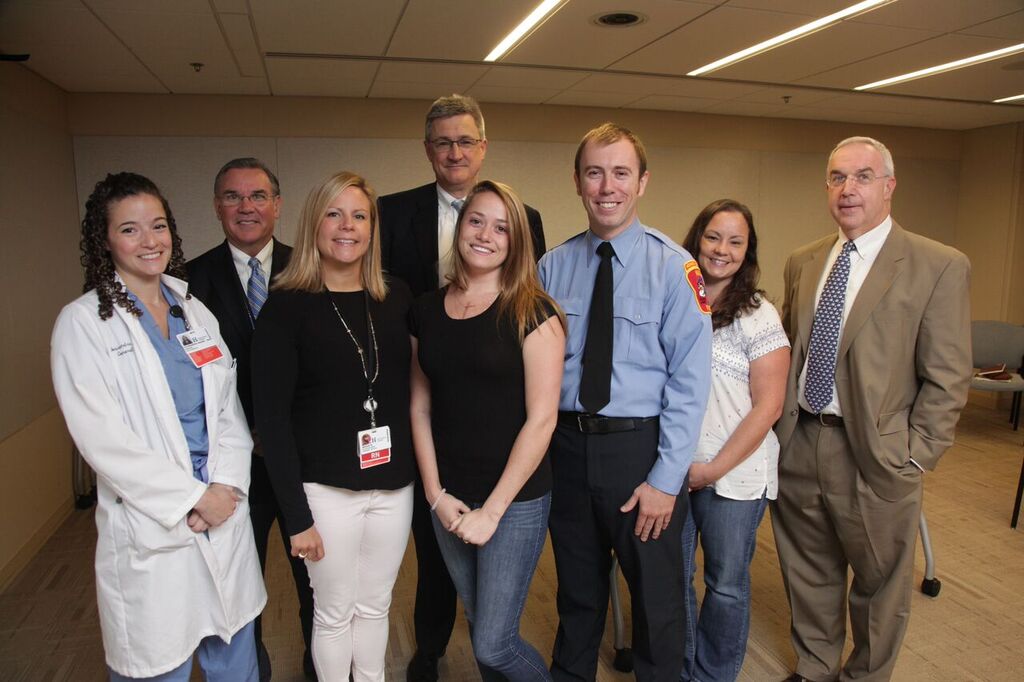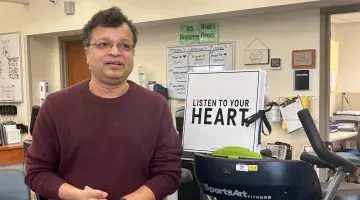Devon Carini's Story: One young woman’s near-death experience and the team who fought to bring her back
Author

South Shore Health
Medical trauma always shows how very vulnerable we are, and though we can’t plan when, where or how a trauma will occur—when it does, it requires the most diligent medical team response necessary to achieve the best possible outcome. Devon Marie Carini never expected a casual summer afternoon on her way to Nantasket Beach would drastically impact her life.
The 21-year-old South Shore resident was minutes from the beach when her car was struck in the middle of an intersection. Devon was not wearing a seatbelt that day, and the impact of an airbag deploying without the use of a safety belt resulted in a traumatic injury.
When Hull Emergency Medical Services (EMS) arrived on the scene, they immediately recognized the need to bring Devon to a Level II Trauma Center because she appeared to have a significant knee injury and her blood pressure was dangerously low — under 90mm, putting her in a hypotensive state. South Shore Hospital’s Level II Trauma Center assures that the trauma team is always notified by paramedics before a patient arrives, allowing our trauma specialists to prepare to deliver critical care.
Upon arrival at South Shore Hospital’s Emergency Department, the trauma team identified Devon as being very distressed, complaining of chest pain. A Focused Assessment with Sonography for Trauma (FAST) was performed immediately. A FAST test is a rapid bedside ultrasound often used after a trauma to screen for signs of blood in the abdominal wall or organs and for potential pericardial effusion—blood around the heart. After viewing the results of Devon’s ultrasound, Emergency Department physicians Justin Briones, MD, and Heather Studley, MD, diagnosed Devon as having a life-threatening lacerated atrium.
“Because the heart is well encompassed within the bony thorax comprised of ribs and sternum, a traumatic injury to the heart of this nature requires significant force, most frequently that of a motor vehicle crash,” said Dr. Briones. Robert Driscoll, MD, surgeon, and the full emergency response team recognized the need to partner with Brigham and Women’s Hospital, where a Cardiopulmonary bypass (CPB) machine would be readily available as Devon was reaching a critical level.
After being intubated, bilateral chest tubes in place, Devon was ready for transit. Frederick Millham, MD, chief of surgery at South Shore Hospital and Christopher Ducko, MD, thoracic surgeon accompanied Devon in the ambulance, bringing proper equipment to keep her stabilized.
"At one point during the EMTs exceptionally-driven transit, Devon’s vitals were indicating we may need to pull over and open up her chest in the ambulance—something we didn’t want to encounter, but were prepared to do should the need arise,” said Dr. Millham.
Fortunately, Devon’s vitals improved enough to get her safely to Brigham and Women’s Hospital OR team, where Jonathan Gates, MD, director of the trauma center, was scrubbed in and ready to perform open heart surgery. Within a week after she arrived at Brigham and Women’s Hospital, in critical condition, Devon was discharged. In the ensuing weeks, South Shore Hospital clinicians checked in regularly while physical therapy helped her to regain full function in her knee. “They helped me have the support I needed to make a comeback,” Devon said.
There was an emotional reunion at South Shore Hospital this past fall as Devon returned to thank the team of doctors who saved her life, describing what the doctors did as nothing short of “a miracle.”
“Just to be able to see them and say thank you for saving my life is a gift. They truly gave me a second chance at life and I don’t intend to put that aside. I intend to use it to the fullest,” Devon said.
Devon’s family and friends joined her to express their sincere appreciation to the team of doctors and clinicians who cared for her. “To see a young lady come back and have the courage to revisit her trauma and say thank you, helps confirm the passion of what we do each day,” Dr. Millham said.
As a result of the superior team response on a complex case involving multiple agencies—where early recognition, identification and prioritized coordination all came together—Devon is alive and well.
Author

South Shore Health







